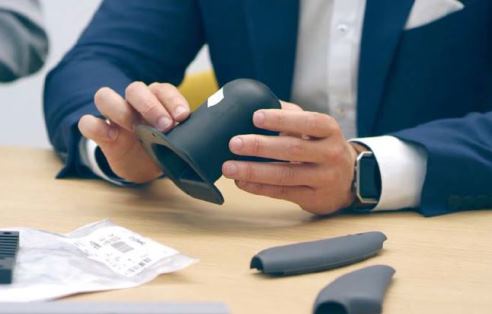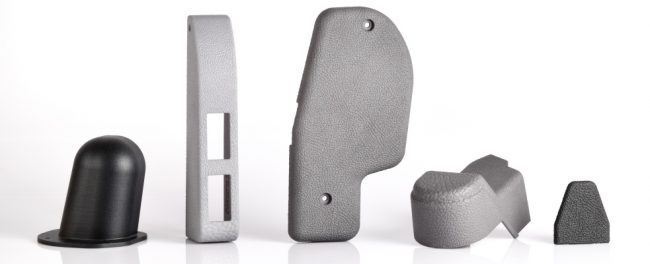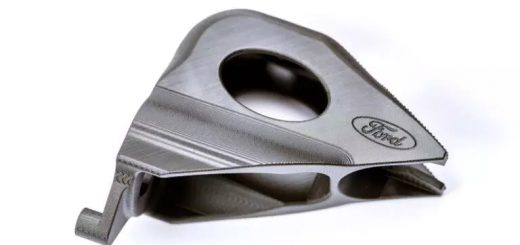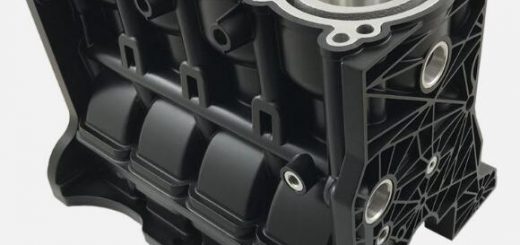EvoBus – Additive Manufacturing Is A Core Element Of Sustainable Spare Parts Management
EvoBus GmbH, a subsidiary of the Daimler Group, is one of the leading manufacturers in the global omnibus segment. In order to continue expanding its pioneering role in times of increasing competitive pressure, EvoBus is pursuing two strategic aims: sustainably increase its profitability and enhance its capacity to innovate. In particular, EvoBus needs to find an answer to the growing challenges in the field of Customer Services & Parts (CSP). Daimler Buses sees additive manufacturing as a key tool in reaching these targets. In order to successfully integrate industrial 3D printing within its organization, Daimler Buses decided to rely on the expertise of Additive Minds, the consulting division of EOS, right from the early project phase. The team of experts at EOS specializes in leading customers through the various development phases of additive manufacturing.
 Flexibility in production: Thanks to 3D printing, spare parts, e.g. for the interior of buses, can be produced quickly and cost-efficiently. (Source: Daimler Buses, EOS)
Flexibility in production: Thanks to 3D printing, spare parts, e.g. for the interior of buses, can be produced quickly and cost-efficiently. (Source: Daimler Buses, EOS)
![]() Starting point
Starting point
For years, the Customer Services & Parts (CSP) unit of EvoBus GmbH has been confronted with rising costs for warehousing and logistics, as well as long lead times. These challenges are driven by the company’s increasingly broad portfolio, coupled with its promise to customers to supply spare parts for buses over a period of more than 15 years, even after series production has been discontinued. EvoBus currently manages over 320,000 active spare parts, many of which are kept on stock – and this number is continually growing. Minimum purchase volumes frequently lead to overproduction. In many cases, the company is forced to purchase 15, 20, or even 100 parts, even though only one is required. This dependency on innumerable suppliers causes a great deal of uncertainty: with repeat orders, there is the risk that the supplier no longer has access to the necessary blueprints and tools, or that financial modifications may be required. With conventional production processes, finding an answer to the growing challenges in the field of Customer Services & Parts (CSP) would be far more difficult for EvoBus GmbH. By contrast, the company sees a great deal of potential in the production flexibility offered by additive manufacturing: “By implementing 3D printing within our CSP business model, we hope to reduce the rising warehousing and tool costs caused by our growing inventory of omnibus spare parts, while also continuing to improve supply performance to our end customers,” says Ralf Anderhofstadt, Project Manager CSP 3D-Druck.
![]() Project
Project
To implement additive manufacturing into their CSP business model, EvoBus chose to rely on the expertise of Additive Minds, the largest team of AM experts in the world. Additive Minds provided support at various levels: by hosting workshops and off-site support events, Additive Minds examined the customer’s entire supply chain and determined how EvoBus could exploit the potential of industrial 3D printing to the fullest. In close collaboration with the customer, Additive Minds prepared an economic feasibility assessment of the project within just a few months. Throughout this period, the Additive Minds experts leveraged the extensive experience gained from over 250 projects across various industries worldwide.
One of the early workshops focused on a systematic approach to selecting the components suitable for additive manufacturing. By applying a “part screening and selection” methodology developed by Additive Minds and used in more than 50 customer projects across numerous industries, EvoBus identified a total of 2,600 such parts. Of these, 35 metal and polymer components were selected for an initial implementation phase. Since no digital blueprints existed for many of these spare parts, Additive Minds and EvoBus jointly examined the available options for digitization through reverse engineering and analyzed potential service providers for this purpose. These efforts led to a separate subproject: how can additive manufacturing be used to create the surfaces of interior parts, which are typically structured? The sustained close cooperation between Additive Minds and the CSP 3D-Druck project enabled Daimler Buses to find solutions to all the questions that cropped up over the course of the project. The material selection process was just as successful: the team determined that the polymer PA2200 could be used for a certain number of components with specific flame protection requirements. However, for the majority of applications, the team concluded that a new type of material would need to be qualified to meet the strict flame protection regulations of the automotive manufacturing sector. EOS and the EvoBus CSP 3D-Druck project have already begun working together on a joint solution.
A pilot project to manufacture the first batch of components was successfully realized at EOS in June 2017. This was an important milestone – reached earlier than expected: “Our collaboration with Additive Minds on the CSP 3D-Druck project considerably accelerated our work right up to the technical and economic proof-of-concept stage, enabling us to focus on and tackle a broad range of topics,” says Anderhofstadt.The next objective of the project is to start making additively manufactured components directly at the end customer. Although a centralized production scenario at the Daimler plant is envisaged for the time being, plans to position the printer directly at BusWorld Homes and outside organizations are being considered for the medium term.
![]() Outlook
Outlook
Industrial 3D printing has already solved many of the current CSP challenges faced by EvoBus. In the long term, it also has the potential to increase the company’s profitability and innovative strength, as well as safeguarding its pioneering role. As the project continues, EvoBus’s additive manufacturing portfolio will be expanded to include additional spare parts made from polymers and metals. Another phase of the project will also fully digitize any remaining analog components to improve the overall efficiency of the spare parts division of the business.
End customers also benefit: thanks to the shorter lead times, the unproductive downtime of their buses is reduced to the bare minimum. Moreover, additive manufacturing allows the complexity and functional integrity of the produced parts to be optimized, empowering EvoBus GmbH to respond even more effectively to specialized customer requirements in future.

Quality: Additively manufactured spare parts meet the high standards of look and feel demanded by premium brands like Daimler Buses for any visible parts in bus interiors. (Source: Daimler Buses, EOS)
“The close cooperation between Daimler Buses and Additive Minds enables us to fully exploit the potential offered by additive manufacturing in the CSP field by defining key steps to defend our pioneering position on the bus market and expand this position in the long term.”
Source:EOS




Recent Comments